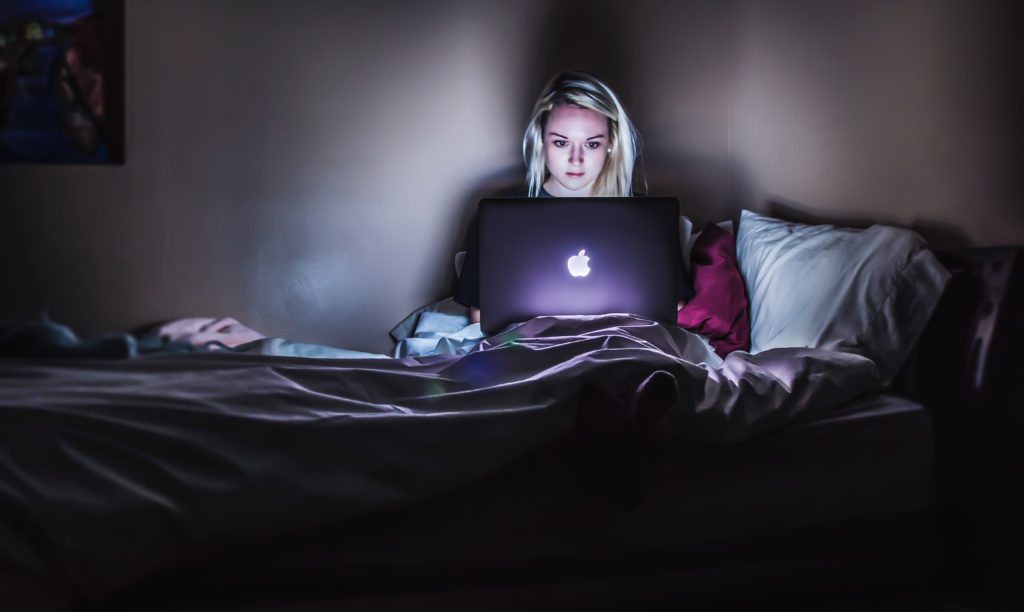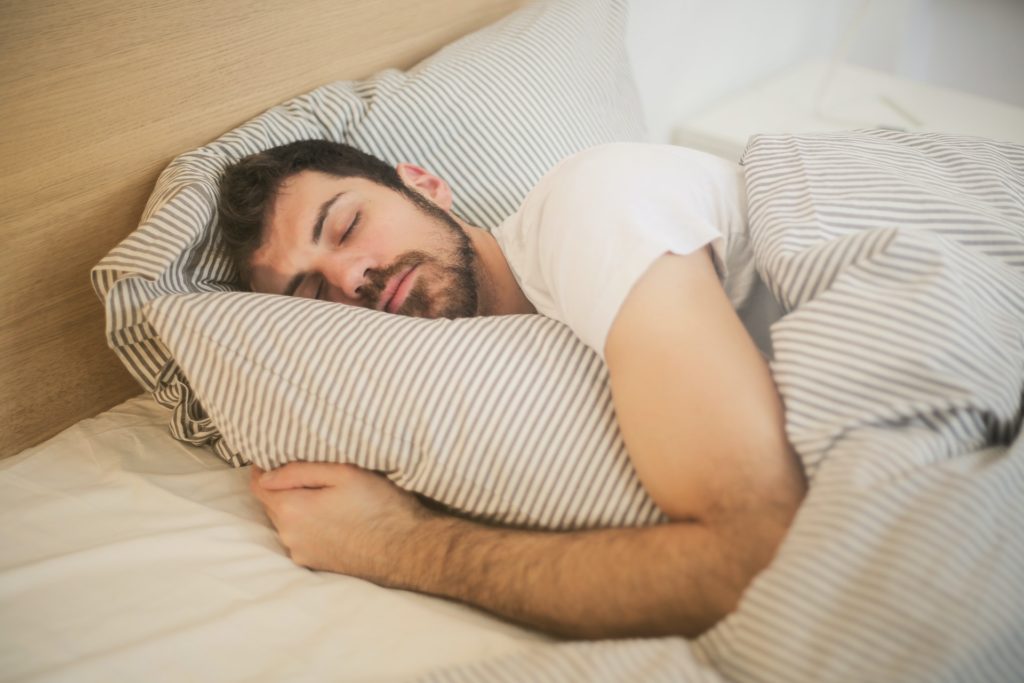Insomnia and vivid dreams are the topics of some popular discussions that have been circulating since the country went into lockdown with many people asking, ‘what’s going on with these weird dreams I’m having?’, or ‘what’s happened to my sleeping pattern?’ and ‘why can’t I sleep at night?’. If these are the questions you’re asking, you’re not alone as it seems the entire nation’s sleep has been disrupted in some way during this pandemic. Insomnia and weird, vivid dreams have been googled a lot recently. Google Trends has noted rises in search terms such as 'coronavirus insomnia' and 'COVID insomnia' over the past couple of months, and on Twitter, #cantsleep has been trending. So it seems that this is a normal thing to be going through at the moment, but for a lot of us, it’s certainly not a welcomed change.
So why are we suddenly having vivid dreams every night and what can be done to stop insomnia that a lot of us are experiencing right now?
Anxiety dreams

Vivid dreams, or in some cases nightmares, are often the result of feelings of stress and anxiety in your waking life. If you’re suddenly having vivid dreams think about what has changed in your life that may be causing this, it may not be obvious to you but any form of anxiety or stress can play out in your dreams.
Stress is one of the biggest culprits in the cause of sleeping problems. When you’re stressed or are going through a stressful event, you’ll often find that it keeps you awake at night, you may have trouble falling asleep and may wake multiple times throughout the night. Insomnia takes its toll on the body, not only does it cause you to feel fatigued during the day but sleep deprivation can also lead to a range of health problems, including weight gain, weakened immune system, mood changes, and some serious conditions such as high blood pressure, heart disease, and diabetes.
Living through a worldwide pandemic is a stressful event for all of us, in some people feelings of stress and anxiety can be more severe than in others, so it’s easy to see why vivid dreams are becoming so rampant right now.
Disrupted sleeping patterns and insomnia
If your quality of sleep has taken a decline during the coronavirus outbreak, then you can probably blame stress for this one too. Although, possible changes in your lifestyle can also play a part in this. If you’re not working or are working from home due to the pandemic you might be going to sleep and waking up later than you usually do, you may not be as active during the day and are not getting enough daylight due to spending most of our time indoors, all of these are factors for why your sleep has become more disruptive or in some cases, non-existent.
Insomnia during this pandemic is quite common, and frankly, understandable given that we’re bombarded with worrying information and news stories that are keeping us awake at night. This heightened level of stress and anxious thoughts racing around our minds will undoubtedly affect sleep.
What is the science behind this?
Anxiety and stress put your body into a state of hyperarousal which is the opposite of the slumber state that you need to be in in order to fall asleep and stay asleep throughout the night. In response to this stress, your body triggers the release of hormones such as cortisol which then activates the sympathetic nervous system, this is otherwise known as the evolutionary ‘fight or flight response’. As a result, your heart rate, blood pressure, and breathing increase, and when this happens during the night it seriously disrupts your stages of sleep, particularly deep sleep.
When you haven’t slept properly your body continues to release these stress hormones meaning that you don’t get the quality sleep you need the next night and it becomes one big vicious circle.
However, you can break the cycle of stress-related insomnia by following these simple tips.
How to treat insomnia due to anxiety and stress

If your sleep disturbances are triggered by stress and anxiety, then it is these conditions you need to work on in order to improve your sleep. There are many ways to reduce anxiety and stress to help you sleep soundly, these methods can also help you get a better night’s sleep even if you’re not feeling particularly anxious or stressed.
1. Reduce your exposure to technology
This is a particularly important one for the climate we’re currently living in. Social media, television, and radio are flooded with worrying news stories about COVID-19, the latest lockdown rules, death figures, etc, and it’s no wonder we’re having sleepless nights. While it’s important to be aware and up to date with the current situation, you don’t need to overload your brain with all of this negative information as there is a risk of this leading to mental health problems such as anxiety, and also sleepless nights.
Plus, the blue light emitted from your mobile, laptop, and TV can suppress the sleep-inducing hormone, melatonin, and disrupt your circadian rhythm making it difficult to fall asleep.
2. Exercise
Exercise is not only a mood booster, energiser, and stress reliever, it can also help tire you out so you have no other choice but to sleep the night away. Exercise early on in the day, though, so that it doesn’t give you a burst of energy right before you’re about to sleep. You can, however, do some light exercises before bed such as yoga which is also good for relaxing the mind. The mood-boosting endorphins that are released when you exercise can help to relieve some of the symptoms of anxiety and depression.
3. Meditate
Meditation and yoga have long been practiced to manage stress and anxiety. These stress management techniques allow you to focus your brain and distract from negative thinking. It also relaxes the body by helping you to control your breathing and decreasing blood pressure, heart rate, and cortisol levels. Meditation, before you’re about to sleep, is really good for putting the body into a state of relaxation that it needs to be able to fall asleep.
4. Practice deep breathing
You don’t have to meditate to practice deep breathing, you can simply take 10 minutes before bed to get your breathing under control. Learning how to breathe properly is the most effective but simple way of managing stress and anxiety. When we’re stressed we tend to breathe shallower and we usually breathe from our chest rather than deep down in the abdomen. Taking time to breathe deeply helps to regulate blood pressure and heart rate and alleviates symptoms of anxiety by making us feel more relaxed. Take deep breaths in through your nose and breathe out slowly through pursed lips, repeat this for several minutes.
5. Talk about your anxiety
This seems like a simple one but in these trying times, face to face human contact is limited and for a lot of people the world is a lonely place during this pandemic. Not only this, but some people find it difficult to talk about their worries, concerns, or problems, but doing so can be very beneficial for your mental wellbeing and sleep problems.
Often when you tell a stranger or loved one your problems or worries they can offer a different point of view and provide some clarity and perspective on the situation, in other words, things don’t seem as bad as they do in your mind when you talk about them out loud. Having someone simply listen to you can be a weight lifted off your shoulders as bottling everything up can be even more damaging.
If you can’t speak to anyone face to face, make a phone call to a loved one or even a stranger via helplines such as Mind and Anxiety UK. Having that phonecall before bed will help to rest your mind, resolve any problems you were having, or help you to find ways of coping with your stress and anxiety in the future. This phonecall is aimed to make you feel more relaxed and less anxious, and simply getting your feelings out in the open takes the pressure off yourself so you can sleep more soundly.
Other ways to improve your quality of sleep and treat insomnia

- Get a daily dose of sunlight. Making sure you’re getting enough daylight is important for your sleep/wake cycle so your body knows when it’s time to wake up and when it’s time to switch off by boosting the production of melatonin. Plus, you’ll reap the health benefits of vitamin D absorption from the sun.
- Stick to a routine. Keep as much of your routine as you can during lockdown, one way to do this is by getting up and going to bed at the same time each day, including on weekends. Routine is key to ensure you’re getting a sufficient amount of sleep each and every night.
- Cut back on caffeine and alcohol. Your morning cuppa is fine but before bed is not ideal when you’re trying to relax. Caffeine and alcohol can be a stimulant so avoid these for several hours before you go to sleep.
- Take a relaxing bath before bed. It’s the perfect way to de-stress and the change in body temperature from the warm bath to the cooler bedroom can naturally induce sleep.
- Keep your bedroom dark, quiet, and free from stimulants. The bedroom needs to be peaceful, tranquil, and comfortable as this will determine the quality of sleep you get. Remove any technology or anything work-related as this space should be primarily focused on sleep and unwinding.
If your sleeping problems have become chronic or it’s affecting your daily life, you can speak to your doctor about other medicinal treatments to help you get a good night’s sleep. Read more about insomnia treatments, here.
How to stop vivid dreams during lockdown
If you’ve suddenly started having vivid dreams since the pandemic began they may be triggered by anxiety, so it’s about managing your anxiety or stress if you want to see an end to these strange dreams. They usually will go away over time and it’s not something to worry about unless it’s causing you distress. Some dreams can be so vivid and unpleasant that it causes emotional distress and trauma, in which case you may want to speak to your doctor. For some people though, vivid dreams can be an enjoyable experience, dreaming is thought to improve memory and may even bring out your creativity!










